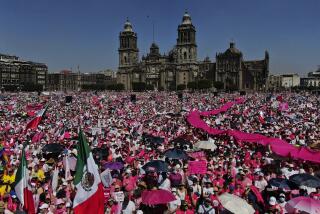It’s Our Monster Threatening Democracy : Philippines: American fighters helped saved President Aquino, but U.S. policies have also undermined the civilian- military relationship.
- Share via
American F-4 fighters screamed low over Manila the afternoon of Dec. 2 in a demonstration of support for the democratically elected government of Philippine President Corazon Aquino. The show of strength may well have been the decisive factor in keeping her in power, at least for the time being.
In the wake of the “unprecedented” American intervention, the military faction loyal to Aquino did seem to turn the tide against the rebels. Predictably, U.S. government officials quickly congratulated themselves for having moved swiftly, yet with restraint, to bolster a trusted friend in her hour of need.
Several days later, though, when “mopping-up operations” carried out by Aquino’s troops had failed to quell street fighting in Makati, Manila’s financial district, U.S. officials were pushing a different line. No longer did they describe the American F-4s as decisive.
“We’re not very involved . . . in terms of our resources,” backtracked Pete Williams, a Defense Department spokesman, as fighting moved into its fifth day. “This is essentially a fight that (the Filipinos) are carrying out,” said Richard A. Boucher, a State Department official.
Such American disclaimers are depressingly familiar to students of the postwar, post-colonial “special relationship” between the two countries. When things are going well in the Philippines, U.S. officials eagerly claim their share of the credit. But when events turn unpleasant, the official talk tends to dwell on America’s “limited leverage” in the distant archipelago.
This inconsistency of American rhetoric is central to the pathology of Philippine-American relations. In 1981, George Bush saw fit to proclaim America’s “love” for Ferdinand E. Marcos because of his “adherence to democratic processes and principles.” Not that many years later, Marcos was the evil dictator, a man who had oppressed his people and was thus unworthy of American support.
The “special relationship” was not as special as it was presumed to be. The U.S. government would indulge Marcos the dictator while he was able to maintain domestic order, thereby promoting American interests in the Philippines. When his control slipped, he was expendable.
American attitudes toward the sixth attempt to oust his successor further demonstrate the conditionality of “special relations.” Extraordinary actions to support Aquino will be taken so long as she seems able to hold things together. But if the center begins to unravel, expect the United States to distance itself from the Aquino government or even to give its support to a faction or leader it perceives to be a more reliable defender of its interests.
The great irony, of course, is that when Philippine soldiers attempt to seize the government by force, they do so with weapons made in the U.S.A. Their guns, ammunition, armored vehicles and airplanes are legacies of American “security assistance” to a succession of Philippine governments. During the martial-law years, 1972-1981, the Philippine military grew from a modest force of 50,000 to one five times as large. This expansion was underwritten by the United States, in the interests of helping Marcos combat a communist insurgency.
Although the Philippine army has proved remarkably ineffective as a counterinsurgent force, it has become quite adept at intervening in the affairs of civilian government. From the very outset of her presidency, Aquino has been a virtual prisoner of the soldiers sworn to protect and defend her. The longstanding deference of the armed forces to civilian authority was abandoned during the military expansion of the Marcos years; it will be extremely difficult for any Philippine president to restore.
If Aquino’s troubles continue and her support in the United States begins to evaporate, we would do well to ask ourselves whether any centrist Philippine leader, committed to the democratic process, would fare any better. Aquino’s shortcomings are plainly evident. But even as we criticize her, we should, in fairness, consider our role in the creation of the military monster that threatens to overwhelm not just Mrs. Aquino but also the democracy it is empowered to defend.
More to Read
Sign up for Essential California
The most important California stories and recommendations in your inbox every morning.
You may occasionally receive promotional content from the Los Angeles Times.













